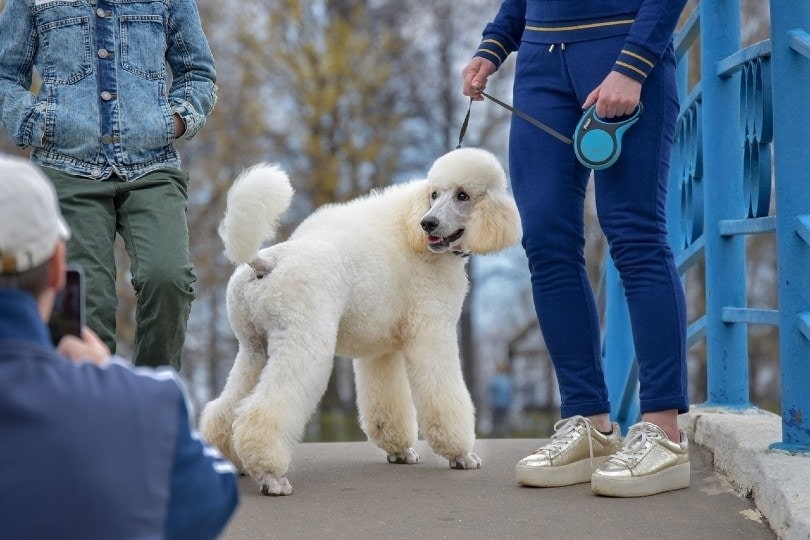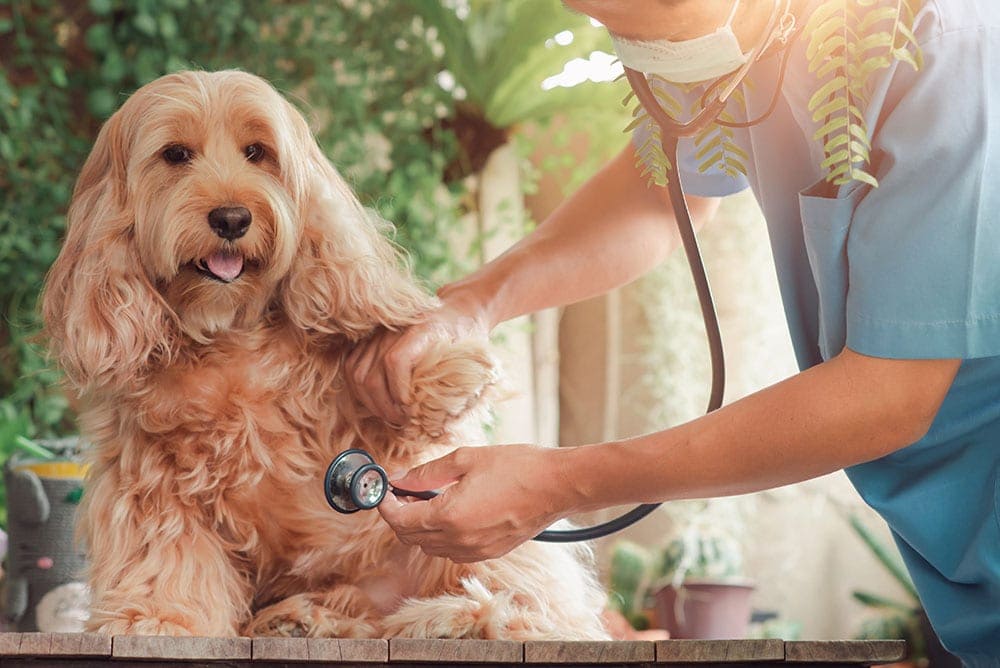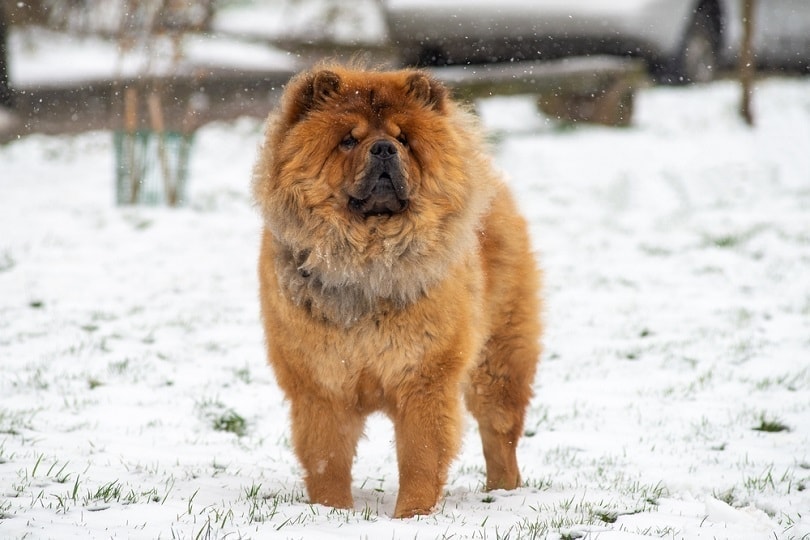Poodle Health Issues: 6 Top Concerns to Watch Out For
Updated on

As a Poodle parent, you already know there will be health issues you must watch out for. Whether your pet is a Standard, Miniature, or Toy Poodle, there are health issues that they are at risk of developing.
Understanding the medical and health conditions will help you prepare for them and determine what you need to do to help your pup should the need arise. Here are the eight top health issues that affect Poodles.
The Top 6 Poodle Health Issues
1. Entropion
Entropion is an eye disease that affects the Poodle breed. It’s a common condition where the eyelids of the dog roll inwards and connect with the cornea. This can be genetic or result from a trauma the dog suffered that caused inflammation in the dog’s eyes. If not treated, this condition can become increasingly painful for your Poodle.
Mild symptoms include red eyes, eye pain, watery eyes, and mucus discharge. More severe signs of this disease include blindness, vision loss, abrasions, scarring, and eye infections. If you see these symptoms in your Poodle, it’s best to make an appointment with your vet for treatment immediately.

2. Hyperthyroidism
Hyperthyroidism in the Poodle happens when too much of the hormone is produced. This dramatically increases the metabolic rate in your pet’s body. It is a severe condition and can, in most cases, result from thyroid carcinoma, which is a deadly cancer in Poodles that most often leads to death.
Some Poodles show no signs of hyperthyroidism, but there are a few minor and major symptoms to watch out for. Minor symptoms include excessive eating, an increase in energy, loss of weight, excessive thirst, and vomiting. Major signs of hyperthyroidism include forced breathing, diarrhea, and difficulty breathing.
There are treatment options for this condition if it is caught in time. The best way to spot this condition is by keeping regular checkups with your dog’s vet so they can pick up on anything abnormal.

3. Epilepsy
Epilepsy is an inherited condition that affects quite a few dogs, and Poodles are no exception. It is a neurological disease where a misfire in the brain causes seizures. No one has been able to find a reason that epilepsy is inherited in dogs. However, while there is no cure for the condition, it is treatable by medicine.
The obvious sign that your Poodle has epilepsy is a seizure. Other symptoms include drooling, jerking, twitching muscles, foaming at the mouth, and losing consciousness. If any of these occur with your Poodle, get it to the vet as soon as possible for diagnosis and treatment. This is a treatable condition, but treatment must continue throughout the Poodle’s life.

4. Addison’s Disease
Addison’s disease is a common condition that affects the Poodle. While it’s not a fatal disease, it’s common in Standard Poodles and must be treated. Symptoms include appetite loss, depression, shaking, and a change in body temperature.
Other major signs include diarrhea, vomiting, dehydration, weight loss, and blood in the cat’s stool. Addison’s disease can also be caused by cancer, severe infections, or an injury, so make sure to get your Poodle to a vet as soon as you can if you suspect it has the condition.

5. Bloat
Another common condition that your furry friend could suffer from is bloat. In Poodles, this condition occurs when the stomach becomes filled with gas, food, or fluid and ends up becoming twisted. This is a very serious condition and can develop very fast. If it’s not treated, it can lead to death.
Bloat is more common in Poodles than in any other breed. Mild signs include loss of appetite, restlessness, excessive drooling, and excess gas. Major signs include pacing and panting, vomiting, pain, a distended stomach, and signs of being in extreme distress. If any of these symptoms occur in your canine, get it to an emergency vet right away.
6. Hip Dysplasia
Hip dysplasia occurs most often in large dogs, and Standard Poodles are more apt to experience it; it can affect any dog, regardless of its size. It’s more common in older dogs as well.
Hip dysplasia causes the hip joints to weaken and deteriorate and can seriously affect the dog’s quality of life. Mild signs that your Poodle has hip dysplasia include pain and stiffness, an unusual gait, a clicking sound in the hip joint, and difficulty getting up and down. Major signs include hind leg lameness, limping, appetite loss, and muscle atrophy.
These are just a few of the top concerns you must look out for when you have a Poodle as a pet. While all dogs have health issues they might inherit, Poodles seem to have more than most in some of these categories.

Tips for Keeping Your Poodle Healthy
While a Poodle is susceptible to the six conditions above, that doesn’t always mean that your Poodle is going to develop any of them. While some of these conditions and diseases are inherited, there are things you can do to try and keep your Poodle healthy and happy. We’ll discuss a few of those things below.
Feed Your Pet the Right Way
How well your Poodle eats can directly impact how healthy it is. It’s best to feed your Poodle a high-protein, high-quality dog food so that it’ll have a strong enough immune system to fight off any of the conditions above.
As your pet ages, it’s a good idea to ask your vet for a recommendation for the best food for seniors for the best results.

Exercise is Key
Whether you have a Standard Poodle, Miniature, or Toy Poodle, they still need to be walked every day. Make sure you talk to your vet about the exercise requirements for your Poodle since they aren’t the same for a Toy Poodle as they are for the other types.
Keep Appointments with the Vet
It’s essential to take your Poodle in for vet checkups every few months or when the vet thinks you should. A lot of the issues that Poodles are prone to can be detected early on and treated if you take them in for routine checkups.

Conclusion
Poodles are loving, loyal, energetic, and intelligent dogs, but they are prone to quite a few health issues. Some of these health issues are genetic, but that doesn’t mean your Poodle will end up with one.
When it comes to these conditions, watching for the signs and prevention are crucial to ensuring your Poodle stays healthy. However, if they do, it’s best to talk to your vet to determine the best course of action and possible treatment.
See also:
Featured Image Credit: JLSnader, Shutterstock














